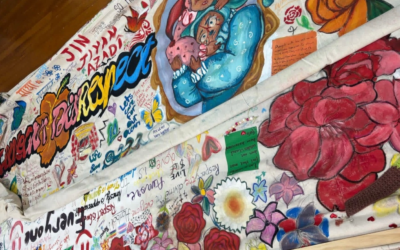Sydney celebrated anime and Japanese culture in a two-day festival at the International Cultural Centre Sydney (ICC Sydney) on March 7 and 8.

American voice actors David Mantraga and Ricco Fajardo with cosplayers at Madman Anime Festival 2020 in Sydney. Photo by Maryem Abdellatif
Anime festivals, also known as anime conventions, are gaining more attraction as more and more people are attending every year. Over the last decade, some anime festivals in Sydney have witnessed a 120 per cent increase in attendance rates.
Special guests invited to the festival include; USA voice actors David Matranga, Ricco Fajardo, and Bryce Papenbrook, as well as Japanese animator Shingo Adachi, J-pop idol Arisa Uki, Sydney-based J-pop group AGS102, and Taiwanese cosplayer Mon. They took part in a number of panels and performances throughout the duration of the festival, all of whom were warmly greeted by excited Australian fans.
The growing popularity of anime conventions seems to reflect a connection over anime between people from different groups in society.
In an interview with Matranga and Fajardo, Matranga suggested that “anime in some way, even from its very beginning, was a medium or an art-form that spoke to people who felt they were on the margin or felt they weren’t connecting or didn’t belong.”

Cosplayers at Madman Anime Festival 2020 in Sydney. Photo by Shayma Abdellatif
A major part of the anime community is cosplaying. In a way, anime conventions provide a safe space for cosplayers and anime fans to practice their hobby without fear of judgement or criticism.
Cosplay entails dressing up as acharacter from a movie, book or cartoon, however in recent years, cosplay has been mainly associated with Japanese anime and manga. Despite misconceptions about cosplay, it has grown as a contemporary art form.
One cosplayer, Jeremy*, said that cosplay has boosted his confidence and gave him the courage to explore new things and connect with more people from the anime community.
“I’m not very open about ‘hey this is me’, but in this community, I feel very accepted to show myself in a different way. It’s very empowering,” he said.
Many people enjoy the creative aspect of cosplay as a way of connecting and appreciating their favourite anime characters and meeting others from the same fandoms.
Will*, another cosplayer at the festival, has also said “[cosplaying] has given me a whole lot of new friends that I wouldn’t have been able to meet otherwise. It’s lovely to see the same people here every year.”

Attendees watching anime at Madman Anime Festival 2020 in Sydney. Photo by Maryem Abdellatif
Matranga and Fajardo also highlight the way anime breaks barriers and connects people. Growing up watching anime, Fajardo recalls countless times where strangers have struck conversations and shared personal stories with him after seeing an anime pin or sticker that he carried.
When asked, what about anime that connects people, Matranga said that perhaps it is due to anime’s ability to portray genuine feelings and personal struggle of ordinary individuals. He said, while people divide over ethnic or religious differences, anime has succeeded in bringing people together.
“Anime never shied away from real human relationship in a way. It doesn’t dumb it down, it wants to find out about someone’s backstory and their struggle and their pain,” said Matranga.
Adding to that, Fajardo said that the growing popularity of anime is also owed to the genuine efforts of fans who create networks of support.
“This is a fan generated community. The heart and soul of it exist in the people and I think that’s something that a lot of larger corporations are having a hard time wrapping their heads around,” he said.

Art and anime merchandise stalls at Madman Anime Festival 2020 in Sydney. Photo by Shayma Abdellatif
The convention is one of three that are held annually in Sydney. It is organised by Madman Entertainment, a wholesale distributor of DVD and Blu-ray products, in collaboration with Australia’s top anime streaming provider, AnimeLab.
Matranga and Fajardo are part of the English voice cast in the recently released anime movie My Hero Academia: Heroes: Rising. The movie was released in cinemas on March 12.
*The interviewed cosplayers did not disclose their full names due to concerns about work and social life.



